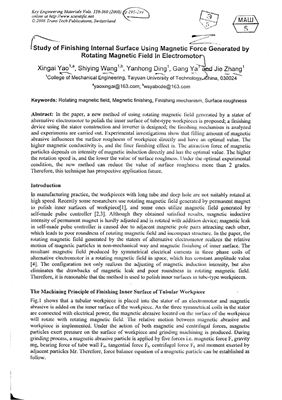Статья. Опубликована в журнале "Key Engineering Materials". – 2008.
– Vol. 359-360 – P. 295-299.
Авторы: Xin Gai Yao, Shi Ying Wang, Yan Hong Ding, Gang Ya, Jie
Zhang.
Статья на английском языке.
Название на русском языке: Исследование финишной обработки
внутренних поверхностей с использованием магнитных сил, созданных
вращающимся магнитным полем в электродвигателе.
Аннотация к статье на английском языке:
In the paper, a new method of using rotating magnetic field generated by a stator of alteative electromotor to polish the inner surface of tube-type workpieces is proposed; a finishing device using the stator construction and inverter is designed; the finishing mechanism is analyzed and experiments are carried out. Experimental investigations show that filling amount of magnetic abrasive influences the surface roughness of workpiece directly and have an optimal value. The higher magnetic conductivity is, and the finer finishing effect is. The attraction force of magnetic particles depends on intensity of magnetic induction directly and has the optimal value. The higher the rotation speed is, and the lower the value of surface roughness. Under the optimal experimental condition, the new method can reduce the value of surface roughness more than 2 grades. Therefore, this technique has prospective application future.
In the paper, a new method of using rotating magnetic field generated by a stator of alteative electromotor to polish the inner surface of tube-type workpieces is proposed; a finishing device using the stator construction and inverter is designed; the finishing mechanism is analyzed and experiments are carried out. Experimental investigations show that filling amount of magnetic abrasive influences the surface roughness of workpiece directly and have an optimal value. The higher magnetic conductivity is, and the finer finishing effect is. The attraction force of magnetic particles depends on intensity of magnetic induction directly and has the optimal value. The higher the rotation speed is, and the lower the value of surface roughness. Under the optimal experimental condition, the new method can reduce the value of surface roughness more than 2 grades. Therefore, this technique has prospective application future.

